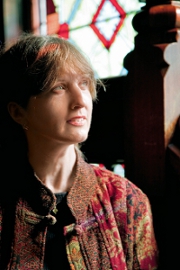Centuries of Need
By Julie Flaherty
Susan Holman, N83, studies the history of hunger, poverty and aid through millennium-old religious texts

Susan Holman, N83, has read accounts of humanitarian assistance that date back as early as 300 A.D., when Christians provided food and clothing to prisoners. Photo: Stephen Sheffield
Susan Holman’s first job was as a registered dietitian with the Women, Infants and Children (WIC) program in Boston. But working with so many low-income families who faced problems beyond nutrition was emotionally challenging.
“Day in and day out I could not escape sensing need,” Holman, N83, would later write. “It adhered to the pores of my skin and lined my nerves.”
To cope, Holman, who had always had an interest in religion, began reading fourth-century Greek sermons on poverty, hunger and disease, and was soon engrossed in how previous generations had dealt with these same issues. She eventually entered Harvard Divinity School and later earned her Ph.D. from Brown University.
Although her clinic days are behind her, she often draws on her nutrition degree in her role as an academic research writer and editor at the François-Xavier Bagnoud Center for Health and Human Rights, where she is managing editor of Health and Human Rights: An International Journal.
“It’s a delight to be able to encourage those in religious studies to think about poverty and justice issues as they relate to public health,” she says, “while at the same time alerting colleagues in the sciences to these voices from the past that share many of their own concerns.”
In her book, God Knows There’s Need: Christian Responses to Poverty (Oxford University Press, 2009), she looks at how the early church dealt with poverty, and looks to her own experiences as a dietitian in making sense of it.
Tufts Journal: What did humanitarian efforts look like for the early Christians?
Susan Holman: As early as the year 300, Christians were providing food and clothing to strangers in prison. The life of a widow named Euphemia, who lived in what is now eastern Turkey, provides an encouraging model of someone who was visiting street people daily, asking what they wanted for lunch and then providing it for them. She was constantly banging on her neighbors’ doors (and even barging into their houses) to demand donations for the poor.
What lessons do these writings have for people who fight hunger and poverty today?
The ancient texts provide the voices of exemplars of various stripes that show how these issues of public health, justice and basic respect for people have been addressed for millennia. They can be very encouraging reminders at moments when we might feel like giving up. They show us what has or has not been tried. And of course they remind us that poverty is not a new problem, that the responses take perpetual action that is new in each generation, new in each moment.
Are the stories all ones of inspiration?
We can look at such models and accounts carefully and critically; not every practice is to emulate! We have several stories of Christian benefactors organizing handouts for people lined up in the street who then strike or shame the odd beggar who gets caught going through the line more than once.
While most of the examples from the past are more about handouts than they are about empowering people, there is a strong sense in the particular Greek texts I’ve worked with that giving is justice, not “pity,” and that there is a moral obligation to view these individuals in need as exactly like us, with a right to human dignity, basic services like water, clothing and food, and that it is a social injustice to discriminate against them because they are poor. Jewish charity, the Islamic system of alms and early Syriac Christian texts all share a common linguistic idea of “charity” or “almsgiving” as essentially synonymous with justice.
You say that when you were studying public health food policy in the late 1980s, people were put off by discussions of religion. Why was that, and how have things changed?
When I was in graduate school, “religious responses to poverty” often seemed to translate into the idea of forced evangelism. I remember mentioning my interest to one nutrition professor, who became defensive and spoke of growing up in a missionary household—which was not at all what I was talking about, though it did help me understand her reaction.
In public health today, I think the work of [Partners in Health co-founder] Paul Farmer and others has helped create an openness, since discussions of poverty, anthropology, medicine and justice lead easily into topics such as Catholic liberation theology and faith-based NGOs. Dr. Geoff Foster, a pediatrician and community activist based in Zimbabwe, is one of a number of experts interested in formally connecting academics, religious groups and civil society practitioners engaged in children’s health issues with the work of the U.N. and governments. The openness to such intersections is very exciting.
This story was first published in the spring 2010 Tufts Nutrition magazine.
Julie Flaherty can be reached at Julie.flaherty@tufts.edu.
